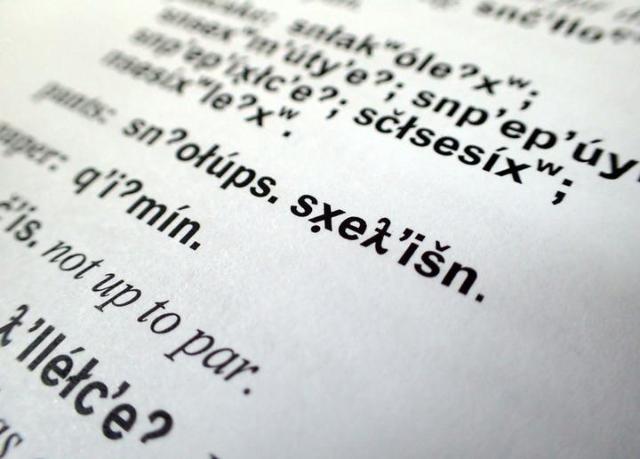 |
Canku Ota
|
 |
|
(Many Paths)
|
||
|
An Online Newsletter
Celebrating Native America
|
||
|
April 2018 - Volume
16 Number 4
|
||
|
|
||
|
Regional Tribes Hold
Salish Language Conference
|
||
|
by Katie Botkin For
The Spokane Spokesman-Review
|
||
Indigenous languages once considered nearly extinct could be heard echoing through the halls of Northern Quest Resort and Casino this week. Small children called out to parents, and friends hailed one another with Salish-language jokes. All were attending the 2018 Celebrating Salish Conference, which ended Friday. The Salish language is endangered. That's true whether you're talking about Salish proper, otherwise known as Bitterroot Salish and historically spoken by the Flathead tribe of Western Montana; or if you extend the term to include Kalispel and Spokane, so closely related to Bitterroot Salish that they're typically considered dialects. It's even true if you look to other area Inland Salish languages, such as Coeur d'Alene and Colville-Okanagan. The number of elders in each tribe who still speak their native language has dwindled to a handful – and in some cases, there are none at all. However, revitalization efforts are underway. At the casino this week, conference workshops explored teaching using songs, games and conversation. In one immersion session, a woman wiped tears from her eyes as she spoke, thanking the elders present. "We learn a lot from you, even if you're just BS-ing," she said. During another, attendees introduced themselves in the Spokane language, offering their name, their tribe, their lineage. An 87-year-old woman related how she learned Spokane when she was young, but for many years didn't speak it – had forgotten it, in fact. "As I sit here and listen to people speaking Indian, I think, ah, yes, that's right, that's what that is." Accents and grammatical structures sometimes differed between the elders and the younger people, who are second-language learners. Some younger attendees spoke about how they were hesitant to speak in Spokane because they were afraid of making errors. The 87-year-old put a humorous spin on this: Soon, she said, "we won't be able to criticize anybody." Elder Pauline Flett talked about how "descriptive" Spokane is. She gave the example of the Spokane word for long men's pants. The root comes from "the sound of a little dog chewing," because new, stiff jeans made a similar sound when men slid their legs into them. Elder Pat Moses gave another example, noting that the word for non-moccasin shoes comes from the words for "force in" and "foot." Technical challenges were covered, as well as how technologically adept tribal members could help even if they didn't know the language. "I wasn't raised in the language," said Okanagan speaker Jordan Coble, but other skills "brought me to the language, and now the language is my path." Levi Bent of the Syilx Language House in Penticton, B.C., told a cautionary tale of how he once sat with an elder for many sessions before the elder agreed to be recorded telling stories in his language. Once Bent got home, thinking he'd "struck gold," he discovered his recording was terrible quality. To remedy this problem, he hosted a workshop on how to properly record elders speaking. One workshop track was devoted entirely to youth engagement, in Salish and English. In between icebreaker games, teens talked about their struggles and opportunities with younger kids. Salish-language karaoke contests and entertainment took place Tuesday, Wednesday and Thursday evenings. The conference concluded Friday after language revitalization effort updates. |
||
|
|
|
|
||
|
|
||
| Canku Ota is a free Newsletter celebrating Native America, its traditions and accomplishments . We do not provide subscriber or visitor names to anyone. Some articles presented in Canku Ota may contain copyright material. We have received appropriate permissions for republishing any articles. Material appearing here is distributed without profit or monetary gain to those who have expressed an interest. This is in accordance with Title 17 U.S.C. Section 107. | ||
|
Canku Ota is a copyright ©
2000 - 2018 of Vicki Williams Barry and Paul Barry.
|
||
 |
 |
|
|
The "Canku
Ota - A Newsletter Celebrating Native America" web site and
its design is the
|
||
|
Copyright ©
1999 - 2018 of Paul C. Barry.
|
||
|
All Rights Reserved.
|
||
